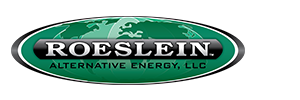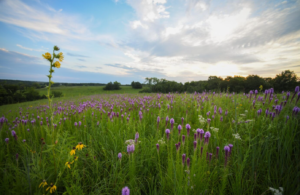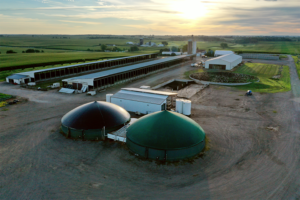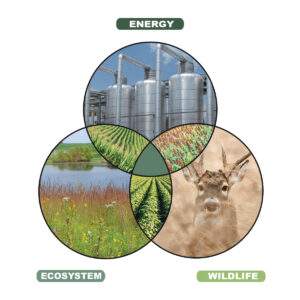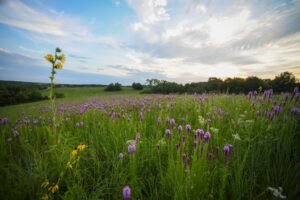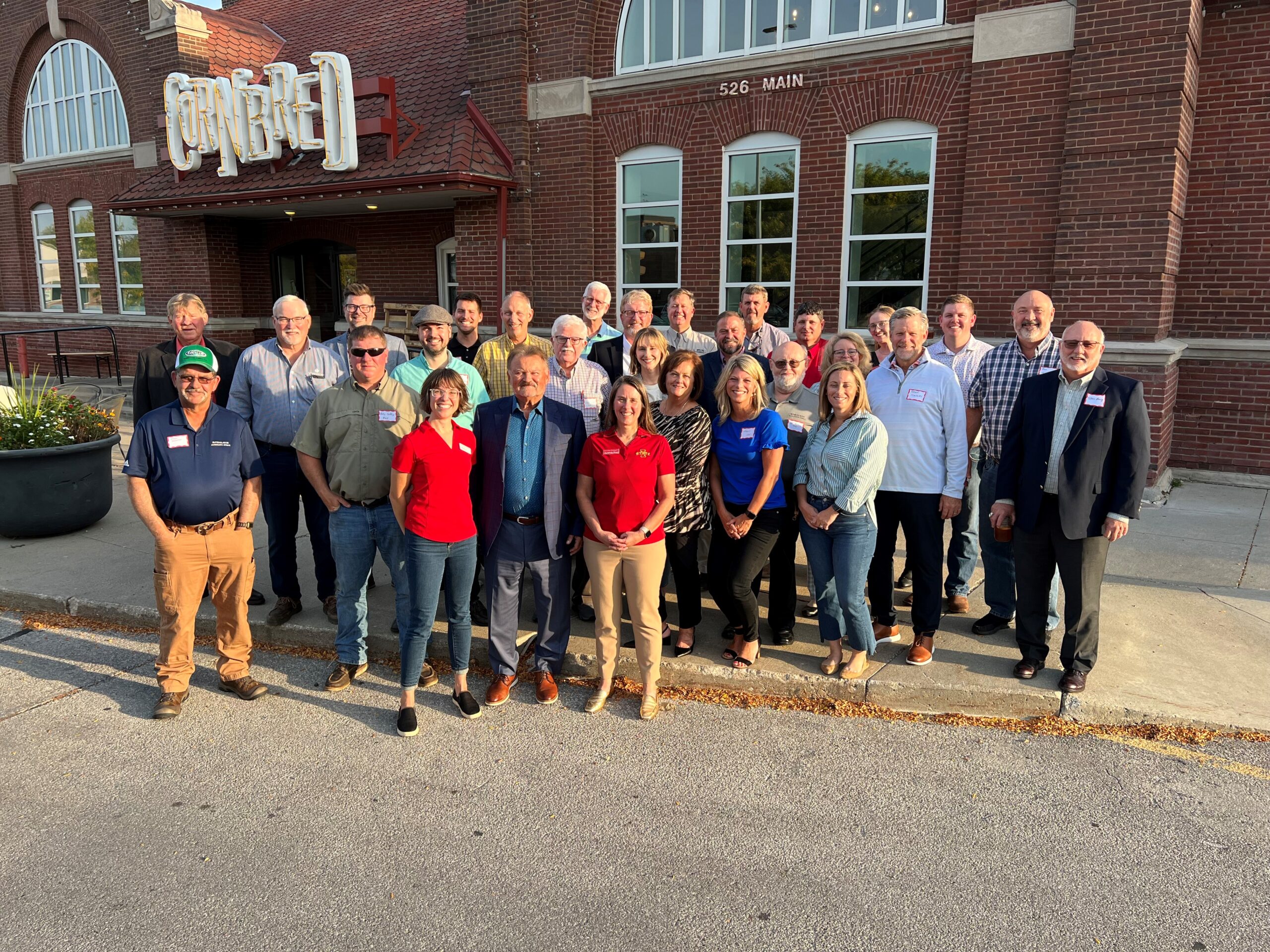America is in the midst of an energy transition that is impacting all sectors of our society, changing the way we power our industries, heat our homes, fuel our cars, and grow our food. The energy systems of the future must continue to be reliable, abundant and affordable, while also addressing climate change and other environmental challenges. Progress is being made to decarbonize the electric grid, where renewables plus nuclear energy now constitute over 42% of the energy supply1. However, there is another energy grid, the natural gas grid, where renewables represent less than 0.5% of the supply2,3. Renewable Natural Gas (RNG), produced from organic wastes and biomass through the process of anaerobic digestion, can play several unique and critical roles in the energy transition. Among other benefits, RNG can reduce greenhouse gas emissions in otherwise difficult to decarbonize sectors of the economy while also serving as an engine of economic growth and rural development, and improving the environmental sustainability of food and agricultural systems.
Exploring RNG’s Role in Decarbonizing Agriculture, Transportation, and Beyond
We recently interviewed Ben Kruger, VP of the Renewables Division at Roeslein & Associates (Left), and Bryan Sievers, Director of Government Relations at Roeslein Alternative Energy (Right), a subsidiary specializing in renewable natural gas (RNG) production. With extensive experience spanning agricultural and energy sectors, they bring deep insights into transforming organic waste into sustainable energy solutions. Their work involves developing RNG projects that leverage farm-generated manure waste, navigating complex regulatory frameworks like the California Low Carbon Fuel Standard (LCFS), and advancing domestically produced renewable energy initiatives. Through innovative engineering and strategic project development, Ben and Bryan are at the forefront of creating sustainable infrastructure that bridges agricultural practices with clean energy production.
Read the full article here:
Horizon II: How Restored Prairie Will Contribute to Renewable Energy Production
Horizon II: How Restored Prairie Will Contribute to Renewable Energy Production
By Adam Voight
First published in Conservation Federation of Missouri Magazine, January 2025
Restoring 30 million acres of prairie in 30 years is an ambitious goal, but if there is one person who can realize that vision, it’s Rudi Roeslein. Rudi founded Roeslein Alternative Energy (RAE) in 2012 after spending more than 30 years building a global engineering, manufacturing, and modular construction company. Energy consumption, reliance on fossil fuels, and the associated environmental impacts deeply concern Rudi, prompting him to invest $57 million of his own money to develop a solution.
Rudi prides himself on finding solutions where others see problems. When he purchased a farm in northern Missouri, it reflected the toll that decades of farming marginal land can take on the landscape. As an avid outdoorsman and conservationist, his goal was to improve wildlife habitat while maintaining a farming operation. Rudi’s farm, along with many others across the Grand River basin —once a thriving grassland ecosystem—had been stripped of its biodiversity. Erosion had taken its toll, and soil quality had degraded from years of traditional row-cropping practices.
Opportunities for Land, Wildlife, and Renewable Energy
To be clear, we do not view farming as the problem. We strongly support our farmers and the essential role they play in feeding and fueling our country. Our aim is to help restore balance to native ecosystems while creating additional revenue streams for farmers and landowners. Current practices are not sustainable. However, we can improve soil, water, and air quality while introducing new financial incentives to landowners. There is an opportunity to develop solutions that restore native ecosystems, benefit wildlife, and produce renewable energy. Rudi’s northern Missouri farm is now a shining example of what is possible.
In September 2023, Roeslein Alternative Energy was awarded an $80 million grant from the U.S.D.A.’s Partnerships for Climate-Smart Commodities program. The funding will support a five-year pilot project called Horizon II (H2), which will take place in Iowa and Missouri. The goal of H2 is to demonstrate a “Climate-Smart Future for Corn, Soybean, Livestock, and Renewable Natural Gas Production.” Eleven partner organizations are contributing to the program: Iowa State University, University of Missouri, Missouri Prairie Foundation, The Nature Conservancy, Conservation Districts of Iowa, Iowa Agriculture Water Alliance, Iowa Soybean Association, Sievers Family Farms, Soil and Water Outcomes Fund, Smithfield Foods, and Veterans in Agriculture.
With this funding, we can begin realizing the pathway to restoring native grasslands while helping support our country’s energy needs. The grant award is a significant step toward advancing RAE’s core mission: developing a market-based solution that uses sustainably harvested biomass to create renewable natural gas while assigning economic value to restored native grasses, prairie plants, and winter-hardy cover crops.
“Since founding RAE, our overarching goal has been to provide farmers an alternative way to use land, especially highly erodible acres, in ways that will benefit the environment, wildlife, and their livelihood,” said Rudi Roeslein, RAE founder and chairman.
Horizon II digestors, Stockton, Iowa
Restoring Native Grasslands and Supporting Energy Needs
The grant will compensate farmers and landowners for biomass production, greenhouse gas reductions, and carbon sequestration in the soil through an outcomes-based program promoting cover cropping and prairie restoration practices. The program will focus on restoring marginal, low-performing acres to prairie. Program partners will collaborate with farmers, landowners, and other stakeholders, including historically underserved producers, to ensure equitable access to the opportunities offered by low-carbon agriculture. RAE and its partners will supply native seeds and assist with the prairie planting. The resulting sustainably harvested biomass will be added to anaerobic digestors to create renewable natural gas.
Our nation has a massive 2.3 million miles of natural gas pipeline capable of supporting renewable energy growth. Renewable natural gas created from manure and prairie biomass has the same molecular composition as traditional natural gas and can be fed directly into the national grid. This offers a new pathway for creating renewable energy in the heartland. While not the only solution for improving energy production, it is one that can help reduce reliance on fossil fuels and provide additional income to local farmers and landowners—a win for rural farming and for restoring native grasslands.
From a communications standpoint, our primary goal is to educate landowners and the public on the opportunities available and the improvements we are making. We developed a media platform, Prairie Prophets, to showcase this work. It can be accessed at PrairieProphets.com and across all social media channels. Through this platform, we will share stories highlighting the work being done throughout the grant, as well as the people and places involved. We hope to inspire not only landowners but also the children and grandchildren of current landowners. These themes are further explored in a new book, Prairie Power: How Prairies Can Heal the Planet, written by Kathy Love, with a foreword by Rudi Roeslein. Prairie Power traces the history of settlement and the transformation of the landscape. It describes the immense natural value of native plants and animals who depend on them. It also offers hope to rural communities and their residents who want to make a living on the land.
Inspiration and Collaboration
We’re all inspired by someone—Rudi Roeslein inspired me with his vision and the way a successful private company can not only maintain a solid bottom line but also revolutionize renewable energy production while supporting conservation efforts. Rudi himself was inspired by others. Dr. Peter Raven, one of the world’s leading ecologists, was an early supporter of Rudi’s vision of combining prairie restoration with renewable energy. At every obstacle that seemed insurmountable, Dr. Raven offered encouragement. Ecologist Dr. David Tilman also played a significant role. Dr. Tilman’s research suggests that “growing mixed prairie grasses on the world’s degraded land could produce enough bioenergy to replace 13 percent of global petroleum consumption and 19 percent of global electricity consumption. Fuels made from prairie biomass are ‘carbon negative,’ which means that producing and using them actually reduces the amount of carbon dioxide (a greenhouse gas) in the atmosphere. Prairie plants store more carbon in their roots and soil than is released by the fossil fuels needed to grow and convert them into biofuels.”1
Dr. Lisa Schulte Moore’s development of the STRIPS program (Science-based Trials of Row crops Integrated with Prairie Strips) has shown incredible improvements in soil and water quality when implemented alongside row-crop production. Her research at Iowa State University finds the following: “By strategically adding 10% prairie strips to a no-till corn or soybean field, they found a 95% reduction in soil loss a, 37% reduction in water runoff a, 77% reduction in Phosphorus runoff, 70% reduction in Nitrogen runoff a, and a 70% reduction in nitrous oxide emissions b.”2
The work of Dr. Raven, Dr. Tilman, and Dr. Schulte Moore is inspiring. Along with other efforts— such as Dr. Tom Richard’s C-Change group and the Grass2Gas project—they are leading the way in bridging the gap between biodiversity, cover crops, prairie restoration, and renewable energy. It takes visionaries like Rudi Roeslein to bring these people and practices together. With private and public support, we can achieve a balance between restoring the natural landscape and producing renewable energy.
As conservationist Doug Duren states, “It’s not ours; it’s just our turn.” We all benefit from inspiring the next generation by doing our part to leave the land a little better than how we found it.
–
1 Tilman et al. 2006. Carbon-Negative Biofuels from Low-Input High-Diversity Grassland Biomass | Science
2 a Schulte et al. 2017; b lqbal et al. 2015; a Hirsh et al. 2013; a Tyndall et al. 2013.
Horizon II Seeks 39,000 Acres in Northern Missouri and Southern Iowa for Turnkey Prairie-to-Energy Initiative
Owners of Highly Erodible Land Will Receive $160 per Acre Cash Rent, Renewable Energy Revenue, Potential Environmental Credits
First 1,000 Acres of Native Prairie Now Being Planted Near Princeton, Missouri
St. Louis, MO (February 7, 2024) – The first 1,000 acres of the Horizon II pilot project are being converted to native prairie near Princeton, Missouri, showcasing a new way for landowners to earn income while improving the environment.
The project has funding available for another 39,000 acres of highly erodible land in Northern Missouri and Southern Iowa to compensate landowners. Horizon II seeks to build wildlife habitat, help the environment, and use sustainably harvested native prairie feedstock to create Renewable Natural Gas (RNG). There is also funding available to incentivize planting 40,000 acres of winter-hardy cereal rye cover crops which will also be harvested for RNG production.
Significant Financial Incentives Now Available Owners of Marginal Farmland
Through an $80 million USDA Partnerships for Climate-Smart Commodities grant awarded to a partnership of 13 public and private entities led by Roeslein Alternative Energy (RAE), Horizon II will provide owners of highly erodible land significant income to care for that property in a new, and arguably better, way. The incentives include:
- Rent: $160 per acre per year for highly erodible land for the duration of the contract.
- Turnkey Approach: Horizon II pays all expenses for prairie seed, installation, maintenance for first two years.
- Renewable Energy Revenue: Beginning in year 3, receive $37 per ton of harvested prairie biomass delivered to the RAE anaerobic digester that will be located near Albany, Missouri.
- Or: The landowner receives $1 per ton if RAE handles harvest and delivery.
- Potential Environmental Credit Compensation: Additional income from carbon sequestration and other ecological services (landowner receives 75%).
Planting Process – Emulating Mother Nature
Members of the media are invited to cover the first 1,000 acres of prairie being planted near Princeton, Missouri.
- Dormant Seeding (or Frost Seeding)
- Native Prairie seeds perform best when planted during the cold of winter.
- Seeds are broadcast over-ground beginning in late January.
- During frost-heaving cycles, the seeds work their way to the proper soil depth.
- After a couple of cold months in the ground, the seeds are ready for optimal germination in the spring.
- Locally Sourced Seed Mix: Diverse mix of forbs and grasses native to northern Missouri and southern Iowa, ensuring success in the region.
- Native Prairie seeds perform best when planted during the cold of winter.
Beyond Biogas: Ecological Services, Wildlife Habitat
While Horizon II produces renewable natural gas (RNG) from prairie biomass, the project also offers significant environmental benefits:
- Wildlife Habitat: Creates valuable habitat for native species.
- Ecological Services: Improves water infiltration, soil health, carbon sequestration, and prevents soil erosion.
Join the Horizon II Movement
Landowners, the future of sustainable agriculture is here. Join Horizon II and earn income while making a positive impact on the environment! The project will create a greener future for your land and your community! Join us!
- 39,000 acres still needed: Landowners in the Grand River Basin (northern MO, southern IA) are encouraged to participate.
- Focus area: Smithfield Foods Ruckman Farm near Albany, MO, will be the site of the next Horizon II RNG facility.
Information Session
March 1, 2024 (10:30 AM) with a catered lunch at noon. Please RSVP by contacting Steve Mowry, Director of Land Development and Prairie Establishment at [email protected] or by calling 816-830-6900.
Additional Contacts:
- Will Higgins, Development Manager, [email protected]
- Bryan Sievers, Director, Horizon II Partnership for Climate-Smart Commodities Grant Program, [email protected]
About Roeslein Alternative Energy, LLC
Roeslein Alternative Energy (RAE) is the owner, operator, and developer of renewable energy production facilities that convert agricultural and industrial wastes, along with renewable biomass feedstocks to renewable natural gas and sustainable co-products. RAE engages in these business operations with a focus on incorporating native prairie restoration. RAE recently merged with its parent company, Roeslein and Associates, in July 2023, with its principal offices located in St. Louis, Missouri. RAE was launched in 2012 by Rudi Roeslein, co-founder and chairman of St. Louis-based Roeslein and Associates, Inc. (a global leader in engineering, modular fabrication, and construction of industrial plant facilities). Visit our website https://roesleinalternativeenergy.com/ We also invite you to explore Prairie Prophets at https://prairieprophets.com/.
Frequently Asked Questions
- Q: Why is Horizon II called a turnkey project?
- A: Participating involves no cost to the landowner. They receive $160 an acre in rent, in addition to eventual funds for harvested biomass and potential environmental credits.
- Q: Is there any cost-share involved for participants in Horizon II?
- A: For anyone with highly erodible land who is also interested in grassland habitat, this is a wonderful program. In particular, they don’t have to put up any cost share money as with government programs.
- Q: What contractual agreements are involved for those participating in Horizon II?
- A: Landowners will sign a lease agreement, the length of which will be determined by the amount of time remaining in the grant period. For example, if a landowner agrees to begin participating with 4 years of the grant remaining, the lease will be for 4 years.
- There will also be a separate agreement with the contractor who will install and maintain the prairie so that the parties understand their responsibilities.
- Q: What happens after the grant period expires?
- A: We are committed to finding long-term funding and market solutions to sustain the project beyond the grant period.
- Q: Do I need to manage the prairie myself?
- A: After planting, RAE will remain responsible during the first two growing seasons for mowing, which is necessary to protect the new seedlings. Beginning in year three, harvest of biomass will occur. After year three, an agreed upon prescribed burn plan will be discussed with the landowner.
- Q: Can I still farm other crops on the land?
- A: Yes, you can continue to farm other crops on the land not enrolled in the program.
- Q: How can I learn more about the project?
- A: Visit our website, attend the March 1st information session, or contact us directly using the information above.
Horizon II, Request for Proposal – Accounting Services
Roeslein Alternative Energy, LLC
Horizon II: A Climate-Smart Future for Corn, Soybean, Livestock, and Renewable Natural Gas Production
Request for Proposal
November 7, 2024
- Introduction
The purpose of this Request for Proposal (RFP) is to solicit vendor information, qualifications, approach, and cost for accounting services and related support for an $80 million United States Department of Agriculture (USDA) grant awarded to Roeslein Alternative Energy (RAE). The grant period started September 14, 2023, and runs for a five-year period.
This document includes a profile of the business need, scope, and response guidelines.
- Background
The Horizon II Pilot Project will demonstrate how farmers can earn environmental credit compensation and renewable energy revenue by planting prairie grass and cover crops and harvesting the “biomass” to use as a feedstock in the anaerobic digestion process.
A partnership of 13 public and private entities led by Roeslein Alternative Energy, LLC finalized the grant from the USDA’s Partnerships for Climate-Smart Commodities program. The funding will be used in a five-year pilot project in Iowa and Missouri called “Horizon II” to demonstrate a “Climate-Smart Future for Corn, Soybean, Livestock, and Renewable Natural Gas Production.”
The Horizon II project will enhance climate-smart markets, reduce greenhouse gas emissions, and improve carbon sequestration in the production of corn, soybean, pork, and beef commodities. Horizon II will also create new opportunities for small and underserved producers while benefiting soil health, clean water, flood control, and habitats for native wildlife.
More information on the grant can be found at https://prairieprophets.com/usda-climate-smart-commodities-grant/. Questions regarding the RFP should be sent to: Ron Murray – Grant Accountant at [email protected].
Download the full RFP for Accounting Services, click HERE.
Horizon II, Request for Proposal – Audit Services
Roeslein Alternative Energy, LLC
Horizon II: A Climate-Smart Future for Corn, Soybean, Livestock, and Renewable Natural Gas Production
Request for Proposal
November 7, 2024
- Introduction
The purpose of this Request for Proposal (RFP) is to solicit vendor information, qualifications, approach, and cost for annual GAGAS audit services and related support for an $80 million United States Department of Agriculture (USDA) grant awarded to Roeslein Alternative Energy (RAE). The grant period started September 14, 2023, and runs for a five-year period. This could create the need for six annual audits.
This document includes a profile of the business need, scope, and response guidelines.
- Background
The Horizon II Pilot Project will demonstrate how farmers can earn environmental credit compensation and renewable energy revenue by planting prairie grass and cover crops and harvesting the “biomass” to use as a feedstock in the anaerobic digestion process.
A partnership of 13 public and private entities led by Roeslein Alternative Energy, LLC finalized the grant from the USDA’s Partnerships for Climate-Smart Commodities program. The funding will be used in a five-year pilot project in Iowa and Missouri called “Horizon II” to demonstrate a “Climate-Smart Future for Corn, Soybean, Livestock, and Renewable Natural Gas Production.”
The Horizon II project will enhance climate-smart markets, reduce greenhouse gas emissions, and improve carbon sequestration in the production of corn, soybean, pork, and beef commodities. Horizon II will also create new opportunities for small and underserved producers while benefiting soil health, clean water, flood control, and habitats for native wildlife.
More information on the grant can be found at https://prairieprophets.com/usda-climate-smart-commodities-grant/. Questions regarding the RFP should be sent to: Ron Murray – Grant Accountant at [email protected].
Download the full RFP for Audit Services HERE.
Horizon II, Request for Proposal
Document Purpose
The purpose of this Request for Proposal (RFP) is to solicit vendor information, qualifications, approach, and cost for Roeslein Alternative Energy to evaluate potential vendors to become partners for the Horizon II Partnerships for Climate Smart Commodities Grant.
This document includes a profile of the business need, scope, and response guidelines.
Document Intent and Disclaimer
This RFP is made with the intent to identify a firm (the “Contractor”) to deliver results as described in the subsequent sections. RAE will rely on the contractor’s representations to be truthful and as described.
This RFP is not an offer to contract. RAE assumes no responsibility for Vendors’ cost to respond to this RFP. RAE has no obligation to buy or issue solicitation to any contractor because of this RFP. All responses become the property of RAE.
If RAE amends the RFP, copies of such amendments will be sent to all firms selected for this RFP.
RAE Overview
Roeslein Alternative Energy (RAE) was founded in 2012 as an operator and developer of renewable energy production facilities that convert agricultural and industrial wastes, along with renewable biomass feedstocks, into renewable natural gas and sustainable co-products.
RAE engages in these business operations with a focus on sustainability and environmental improvement. Rudi Roeslein’s vision is to restore 30 million acres of grasslands on marginal lands throughout the Midwest in 30 years. Beyond that, we hope to use this as a model to restore
hundreds of millions of acres of grasslands around the globe.
A rapidly growing population is causing an incredible amount of stress on our landscapes. At Roeslein Alternative Energy, we have a market-based solution to the competing demands of the need for both sustainable agriculture and renewable energy.
When land not naturally suited for agriculture is used to raise corn or soybeans; erosion, soil degradation, and water problems emerge. Ironically, the quest for additional energy often finds prime agricultural acres raising crops for fuel, rather than food. But, there is an alternative that restores balance. It creates a new sustainable energy industry, manages livestock and land resources, while delivering healthier soil, cleaner water, and healthier wildlife habitat.
The solution is anaerobic digestion, which naturally breaks down organic matter in an oxygen-free environment. A byproduct is methane-rich biogas which can be converted to renewable natural gas. The remaining solids can be used as natural fertilizer and the water for irrigation.
Roeslein Alternative Energy works to preserve our lands for the future and to show individual landowners and society as a whole we can collaboratively discover and implement alternative agriculture and energy solutions.
Project Context
A partnership of 13 public and private entities led by Roeslein Alternative Energy (RAE) finalized an
$80 million grant from the federal government’s first pool of funds from the U.S.D.A’s Partnerships for Climate-Smart Commodities program. The funding will be used in a five-year pilot project in Iowa and Missouri called ‘Horizon II’ to demonstrate a “Climate-Smart Future for Corn, Soybean, Livestock, and Renewable Natural Gas Production.”
The Horizon II project will enhance climate-smart markets, reduce greenhouse gas emissions, and improve carbon sequestration in the production of corn, soybean, pork, and beef commodities.
Horizon II will also create new opportunities for small and underserved producers while benefiting soil health, clean water, flood control, and habitats for native wildlife.
RAE seeks a partner who also has the experience collecting field data necessary, quantifying and providing environmental outcome compensation, sampling, and field verification.
To access the full RFP, download HERE.
Read the full Notice of Grant and Award Agreement HERE.
Find a Map of the project area HERE.
Notice of Grant and Agreement Award, USDA
NRCS-ADS-093U.S. Department of Agriculture Natural Resources Conservation Service
NOTICE OF GRANT AND AGREEMENT AWARD
Statement of Work
Purpose The purpose of this agreement, between the U.S. Department of Agriculture, Natural Resources Conservation Service (NRCS) and Roeslein Alternative Energy, LLC (Recipient), is to build markets for climate-smart commodities and invest in America’s climate-smart producers to strengthen U.S. rural and agricultural communities. |
| Objectives
The objectives of this project are to support the production and marketing of climate-smart commodities by providing voluntary incentives to producers and landowners, including early adopters, to implement climate-smart agricultural production practices, activities, and systems on working lands; measure/quantify, monitor and verify the carbon and greenhouse gas (GHG) benefits associated with those practices; and develop markets and promote the resulting climate-smart commodities. Read the full Notice of Grant and Award Agreement HERE. |
Partnership Led by Roeslein Alternative Energy Finalizes Grant to Develop New Climate-Smart Agriculture Value Chain
‘Horizon II’ Pilot Project to Demonstrate How Farmers Get Environmental Credit Compensation and Renewable Energy Revenue by Planting Prairie Grasses and Cover Crops
St. Louis, MO – September 26, 2023 – A partnership of 13 public and private entities led by Roeslein Alternative Energy (RAE) finalized an $80 million grant from the federal government’s first pool of funds from the U.S.D.A’s Partnerships for Climate-Smart Commodities program. The funding will be used in a five-year pilot project in Iowa and Missouri called ‘Horizon II’ to demonstrate a “Climate-Smart Future for Corn, Soybean, Livestock, and Renewable Natural Gas Production.”
The Horizon II project will enhance climate-smart markets, reduce greenhouse gas emissions, and improve carbon sequestration in the production of corn, soybean, pork, and beef commodities. Horizon II will also create new opportunities for small and underserved producers while benefiting soil health, clean water, flood control, and habitats for native wildlife.
Horizon II: Environmental and Wildlife Benefits from Renewable Energy Production
The grant award is a major step toward advancing RAE’s core mission to develop a market-based solution that puts an economic value on restored native grasses, prairie plants, and winter-hardy cover crops by using sustainably harvested biomass to create renewable natural gas.
“Since founding RAE, our overarching goal has been to provide farmers an alternative way to use land, especially highly erodible acres, in ways that will benefit the environment, wildlife, and their own livelihood,” said Rudi Roeslein, RAE Founder and CEO. “This funding will propel Horizon II forward more rapidly than otherwise would have been possible. We will show how farmers and landowners can do well for themselves while also providing ecological services and wildlife benefits.”
Pilot Program in Iowa and Missouri
A pilot will be developed, deployed, and verified in Iowa and Missouri, where much of the nation’s corn, soybeans, and pork are produced. Horizon II seeks to incentivize improved management of nitrogen fertilizer and other inputs on agricultural land, which is critical to the success of climate-smart practices.
- Farmers, livestock producers, and landowners will be compensated for GHG reductions and carbon sequestration in the soil through an outcomes-based carbon credit program.
- Producing winter-hardy cover crops and grassland restoration will be further incentivized through a novel, market-based program that supports renewable natural gas (RNG) production through the anaerobic digestion of herbaceous biomass combined with manure.
- This renewable energy can be fed into the national grid and become part of the sustainable new value chain.
- Program partners will collaborate with farmers, livestock producers, landowners, and other stakeholders, including early adopters of practices and historically underserved producers, to ensure equitable access to the opportunities offered by the low-carbon agriculture of the future.
Horizon II Partner Organizations
Partner organizations involved in the RAE Horizon II project are: Conservation Districts of Iowa, Iowa Agriculture Water Alliance, Iowa Soybean Association, Iowa State University, Missouri Prairie Foundation, Sievers Family Farms, Soil and Water Outcomes Fund, Smithfield Foods, The Nature Conservancy, University of Missouri, Verdesian, University of California-Davis, and Veterans in Agriculture.
“Iowa State University has been working with Roeslein Alternative Energy and many additional partners for nearly a decade, laying the foundation for a climate-smart commodity supply chain based on the anaerobic digestion of prairie grasses and winter hardy crops along with manure,” said Lisa Schulte- Moore, Department of Natural Resource Ecology and Management and co-director of the Bioeconomy Institute at Iowa State University. “I’m excited and thankful for this tremendous investment by USDA toward commercializing our research and development, with the goal of closing system loops to return more value from agriculture to people and the land.”
Once fully developed, deployed, and verified, the program can be extended and tailored to other agricultural commodities (i.e., dairy, poultry) and regions of the country. While focused on GHG reduction and soil carbon storage, these climate-smart agricultural systems will add further value in terms of soil health, clean water, flood control, and habitat for native wildlife.
A Push to Turn Farm Waste into Fuel
Roeslein Alternative Energy featured in New York Times article: Climate change provisions in the Inflation Reduction Act have spurred developers to build ambitious renewable energy projects that turn manure into methane.
Read more: A Push to Turn Farm Waste Into Fuel – The New York Times (nytimes.com)
- 1
- 2
- 3
- …
- 13
- Next Page »
